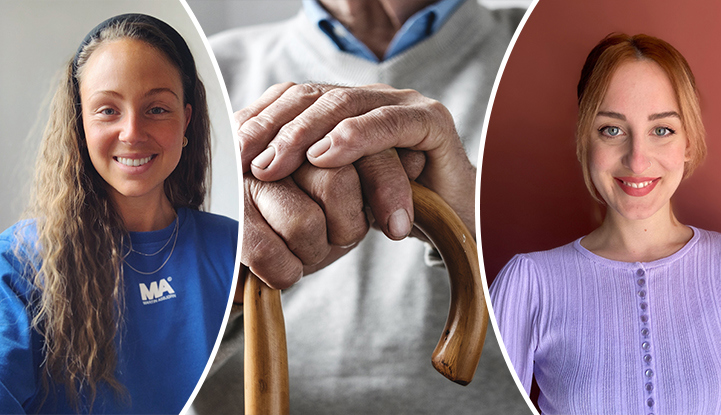"It has to do with the value of human life" – new projects on dignified care for older people
2021-04-20

A total of nine higher education institutions from Sweden, Norway, Denmark, Greece, and the United Kingdom are included in the project, which runs from 2019–2023. The project is led by the University of Brighton and has been awarded 4.5 million euros by the European Commission within the Marie Sklodowska-Curie Innovative Training Network. It is thus no small investment, but it must also deliver solutions for one of Europe's major issues: dignified care for older people.
Two of the fifteen doctoral students in the project are employed at the University of Borås, but due to the pandemic, they are both working remotely from their home countries. Lamprini Xiarchi lives in Greece and was working as a school psychologist when she decided to apply for the doctoral programme in INNOVATEDIGNITY. Her Master's degree was on care of older people and patients with chronic diseases. She describes caring for older people as a complex and difficult issue, and that this is precisely why it aroused her curiosity.
“Working with or studying people who are towards the end of their lives is different. I have noticed that it is not as popular as, for example, working with children. As society changes and more people get older, we can no longer neglect certain groups of older people. It is significant and important that the EU is now focusing on this; it’s time.”
Grew up with her grandmother
When Lamprini Xiarchi was growing up, her grandmother lived with their daughter and her family. Her close relationship with her grandmother, who partly raised her, has influenced her choices in life.
“Growing up with my grandmother was important for me; it has affected me a lot. I have learned to appreciate that type of relationship, and that is probably one of the reasons why I wanted to work with older people.”
In her doctoral thesis, Lamprini Xiarchi focuses on the experiences of registered nurses and nursing students in working with older people care, from a gendered perspective.
“Scandinavian societies promote gender equality, yet there are still wage differences and there are more men in leading positions. In all the European countries we have studied, we know from previous research that gender roles and society's expectations affect career choices and continued careers,” said Lamprini Xiarchi.
In addition to a systematic literature study, she plans three qualitative studies in which she will first and foremost interview nursing students and licensed nurses.
“There is a lack of knowledge in this area,” stated Lamprini Xiarchi.
You live in Greece and will carry out your studies there. What differences do you see between older people care in Greece and Sweden?
“There are major organisational and structural differences. Public older people care in Greece is not so built-up, due to the fact that there are many informal structures instead. For example, it is very common that older people live with or near their adult children. On the other hand, Greek nurses have a longer education: their education is four years long and many also earn a Master's degree.”
Similarities between children and the elderly
Her doctoral student colleague at the University of Borås, Karoline Lang Mathiesen, also lives in and works remotely from her home country Denmark, due to the pandemic. At the time of the interview, parts of society were still closed, but she hopes to soon be able to visit one of the two Danish universities that are also participating in the project. During her Master's degree studies in anthropology, she did six months of fieldwork with children with cancer. When she read about INNOVATEDIGNITY, her interest was aroused, and she sees similarities between working with children and the older people because they are both groups that the Danish society cares for.
“Completing a doctorate has always been a bit of an unspoken dream for me. I got a taste of research when I did my Master's thesis and liked it. It also feels inspiring to be able to make a difference,” said Karoline Lang Mathiesen.
"Tendency to assign different values to different lives"
Poor conditions that were a focus of media attention in a nursing home in Denmark, and not least the pandemic, have sparked debate and focused on how older people are treated.
“There is a tendency to assign different values to different lives, to talk about older people as if they will soon die anyway. But dividing people into different groups in that way is dangerous. Every life has value and everyone has the right to live in dignity here and now, no matter where in life they are,” said Karoline Lang Mathiesen.
In the work on her doctoral thesis, she will investigate what unique, necessary skills are needed in licensed nurses who care for older people. Through interviews and observations in Danish home care, she wants to understand the caring relationship between nurses and older people. She also hopes to have the opportunity to interview older people receiving home care in a Danish municipality, as well, to hear their experiences, and, in the final phase, to discuss the analysis of her studies with managers of the care of older people.
“In the short term, I hope that my studies can make some older people feel listened to. In the long term, I hope that we fifteen doctoral students in the project can together raise awareness of and highlight the issue of dignity in older people care,” said Karoline Lang Mathiesen.
Read more
Lina Färm
Adobe Stock/private

